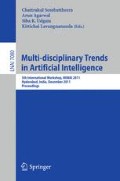Abstract
This Paper outlines a logic based formal approach to represent and reason about the DNSSEC (Domain Name System Security Extensions) protocol. DNSSEC provides security services to the existing DNS protocol mainly through public key cryptography. But, it is well known that even the use of the most perfect cryptographic tools does not always ensure the desired security goals. This situation arises because of logical flaws in the design of protocols. Our aim is to represent and reason about DNSSEC protocol using the Modal Logic system SVO so as to derive the desired goals of the protocol.
Access this chapter
Tax calculation will be finalised at checkout
Purchases are for personal use only
Preview
Unable to display preview. Download preview PDF.
References
Abadi, M., Tuttle, M.: A semantics for a logic of authentication. In: Proceedings of the ACM Symposium of Principles of Distributed Computing, pp. 201–216. ACM Press (1991)
Albitz, P., Liu, C.: DNS and BIND, 4th edn. O’Reilly (April 2001)
Arends, R., Austein, R., Larson, M., Massey, D., Rose, S.: Dns security introduction and requirements. RFC 4033, Internet Engineering Task Force, 1 (March 2005)
Arends, R., Austein, R., Larson, M., Massey, D., Rose, S.: Resource records for the dns security extensions. RFC 4034, Internet Engineering Task Force, 1 (March 2005)
Ariyapperuma, S., Mitchell, C.J.: Security vulnerabilities in dns and dnssec. In: ARES, pp. 335–342 (2007)
Burrows, M., Abadi, M., Needham, R.M.: A logic of authentication. ACM Trans. Comput. Syst. 8(1), 18–36 (1990)
Fagin, R., Halpern, J., Moses, Y., Vardi, M.: Reasoning about knowledge. MIT Press (1995)
Huston, G.: Dnssec - the theory. The ISP Column, 1 (August 2006)
Mathuria, A.M., Safavi-naini, R., Nickolas, P.R.: On the automation of gny logic. In: Proceedings of the 18th Australian Computer Science Conference, pp. 370–379 (1995)
Syverson, P.F., Van Oorschot, P.C.: A unified cryptographic protocol logic. Technical report, NRL Publication 5540-227, Naval Research Lab (1996)
van Oorschot, P.: Extending cryptographic logics of belief to key agreement protocols. In: Proceedings of the 1st ACM Conference on Computer and Communications Security, CCS 1993, pp. 232–243. ACM (1993)
Author information
Authors and Affiliations
Editor information
Editors and Affiliations
Rights and permissions
Copyright information
© 2011 Springer-Verlag Berlin Heidelberg
About this paper
Cite this paper
Babu, K.R., Padmanabhan, V., Bhukya, W.N. (2011). Reasoning about DNSSEC. In: Sombattheera, C., Agarwal, A., Udgata, S.K., Lavangnananda, K. (eds) Multi-disciplinary Trends in Artificial Intelligence. MIWAI 2011. Lecture Notes in Computer Science(), vol 7080. Springer, Berlin, Heidelberg. https://doi.org/10.1007/978-3-642-25725-4_7
Download citation
DOI: https://doi.org/10.1007/978-3-642-25725-4_7
Publisher Name: Springer, Berlin, Heidelberg
Print ISBN: 978-3-642-25724-7
Online ISBN: 978-3-642-25725-4
eBook Packages: Computer ScienceComputer Science (R0)

